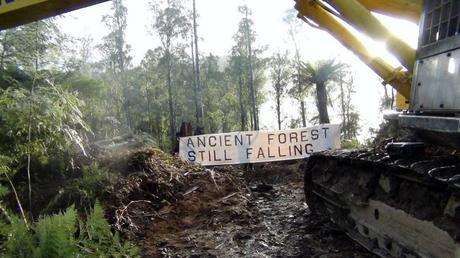by Will Potter / Green is the New Red

The “Workplaces (Protection From Protesters) Bill” is a direct response to environmentalists protesting the logging of Australia’s ancient forests. The Liberal Party made campaign promises that they would protect the logging industry and shut down protesters, and now they’re trying to follow through.
The bill includes on-the-spot fines of up to $10,000, and a mandatory three-month jail sentence for second offenses. It would be the first time mandatory sentences have ever been imposed in Tasmania.
And any organizations that “incite or encourage this illegal behaviour” could be fined up to $100,000.
Supporters of the bill say it’s about “extremists” and “terrorists,” but the primary targets are protesters using non-violent civil disobedience to blockade logging roads and halt clearcutting operations.
As former Green Party leader Bob Brown said: “These laws would have jailed Gandhi and Jesus Christ himself.”The bill doesn’t just target environmentalists, though. It is written so broadly that it could be used against a wide range of protest activity.
“There is a high risk of capturing individuals who would not in any sense be characterized as ‘extremist’,” wrote Senior Counsel Greg Melick in a 36-page report he was asked to prepare for the government.

“Even if the legislation is successful is curbing disruption to business activity by protesters, it is likely to be disproportionate in its effects.”
The report identified hypothetical cases that could be prosecuted under the bill, such as a farmer who would not allow a fracking company to enter his property.
That was enough for the Tasmanian Farmers and Graziers Association to turn against the bill. And unions are concerned that they would be affected as well.
There are already existing laws that cover the scope of this legislation. It’s illegal to trespass or harass, for example. So why make some actions more illegal if done by protesters?
Because this is part of a broader campaign by Abbott’s Liberal Party to roll back environmental protections and cut “green tape” for corporations. As I reported recently for Foreign Policy, these are the same people who support logging in World Heritage protected sites, and dumping dredged soil in the Great Barrier Reef.
The bill was passed by Tasmania’s Lower House in late June, and the Upper House is expected to consider it in October.
But it won’t become law without a fight. Hobart, Tasmania is a quiet town, and often seen as friendly to the logging industry — but more than 500 people come out recently in protest.

